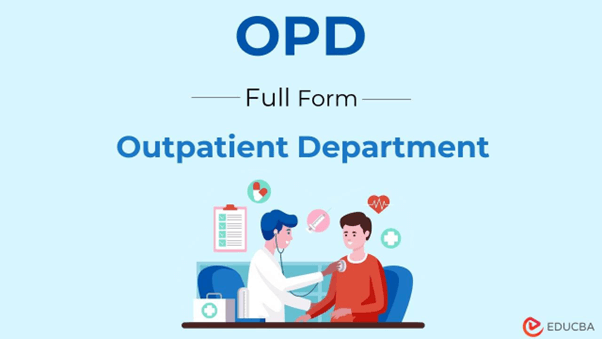Updated February 20, 2023
Full Form of OPD: Outpatient Department
Hospitals have always been critical to humans because they allow people to live healthy lives. In addition, hospitals safeguard people against a wide range of illnesses, including fatal ones. A hospital comprises various departments, with each of them being responsible for the hospital’s success. The OPD is one such department in the hospital. The OPD is the patient’s first contact with hospital personnel. After presenting to the OPD for examination, the OPD doctors refer the patient to the appropriate departments for treatment based on the patient’s needs. This article will discuss the full form of OPD and other details.
OPD: What is it?
The full form of OPD is “outpatient department.” An OPD serves as the primary point of contact between the medical staff and the patient in the hospital. A hospital’s outpatient department (OPD) is divided into various departments, such as the department such as Gynecology, Neurology, General Medicine, Oncology, and so on. Patients arriving at the hospital for treatment are directed to the appropriate outpatient department (OPD) based on their complaints.
Types of Outpatient Department
OPD has various types. These classifications are determined by the features and functions they offer. Some additional OPDs also help the healthcare system run smoothly. Some of them are:
1. Primary Care Clinics
Patients can consult with doctors at primary care clinics. These doctors perform tests and refer patients to specialists as needed. Nutritionists, family doctors, gynecologists, and other specialists are included among primary care physicians. These regular physicians carry out the examination.
2. Urgent Care Center
The urgent care center functions as both an emergency ward and a clinic. It is used for medical procedures that require immediate attention but are not life-threatening. Patients are treated for illnesses and injuries without the use of emergency rooms. The urgent care center reduces the workload of emergency rooms by providing patients with prompt and convenient care.
3. Emergency Management
The term “emergency room,” or simply “ER,” refers to the emergency department. Every hospital has an emergency room for patients who require immediate medical attention. The ER department’s staff consists of highly skilled medical professionals, radiologists, and nurses who treat urgent illnesses or injuries. These experts recognize the problem and immediately begin working to assist the patient.
Importance of OPD in the Healthcare System
Now, since you are aware of the full form of OPD and the various sectors, let’s discuss some of the importance of OPD in Healthcare Systems –
- It acts as a link between the healthcare system and patients.
- It is critical for disease prevention and ensuring that patients recover quickly.
- It manages the number of patients in the inpatient ward by performing minor operations and treatments. After evaluating the patients, only those who require a bed or additional care are transferred to the inpatient ward. As a result, the number of occupied beds is reduced.
- First-time visitors with minor health problems are usually treated in the OPD. Doctors examine patients, provide advice, write prescriptions in the OPD, and lay down the requirement for more specialized treatment as needed. This ensures that everyone gets the desired treatment without any problems.
Benefits of OPD
OPD is a general ward but its many benefits over other hospital departments. Some of them are:
- OPD is less expensive because the patient is not admitted and is not required to pay for the bed.
- Patients receiving treatment in the OPD are not required to be admitted unless their condition does not improve. This reduces the stress of hospitalization.
- Modern outpatient departments are well-equipped for initial diagnosis and investigation, minor procedures, and medical care.
- The outpatient department makes it easy for people to contact doctors and medical facilities. The fees for the outpatient department are also very reasonable.
- The outpatient department is critical in infectious disease management. It is accomplished through surveillance and the use of data to identify common illnesses among people.
Things to keep in mind before visiting an OPD
Before entering any hospital’s outpatient department, you should be aware of the following things:
- Timings of OPD: The hospital determines the OPD schedule. Every hospital has a unique policy that varies by location. The most common OPD hours are from 9 a.m. to 6 p.m. You must check the OPD timing before you visit it.
- Availability of Appointment: You must schedule a meeting with a specialist over the phone or online if you want to consult with them. You can also ask the receptionist to schedule an appointment based on the severity and state of your health.
- Visiting the relevant specialist: It isn’t easy to locate a specialist for your treatment. Thus a general practitioner can refer you to a specialist if necessary. Therefore, if you are unaware of the medical issue, you should visit the OPD.
Conclusion
Good care and prompt treatment are essential for the patient’s faster recovery. The outpatient department is a critical first step in any medical treatment. It aids in the recovery or improvement of a specific medical condition in the patient. The outpatient department (OPD) provides additional services such as diagnosis, lab work, safety tips, etc. It helps to prevent the spread of infectious diseases and facilitates procedures such as vaccination, among other things. Although the outpatient department serves many functions, the facilities and level of care vary. Hope this article has helped you understand the full form of OPD and other details about it.
Recommended Articles
We hope that this EDUCBA information on “Full Form of OPD” was beneficial to you. You can view EDUCBA’s recommended articles for more information,



